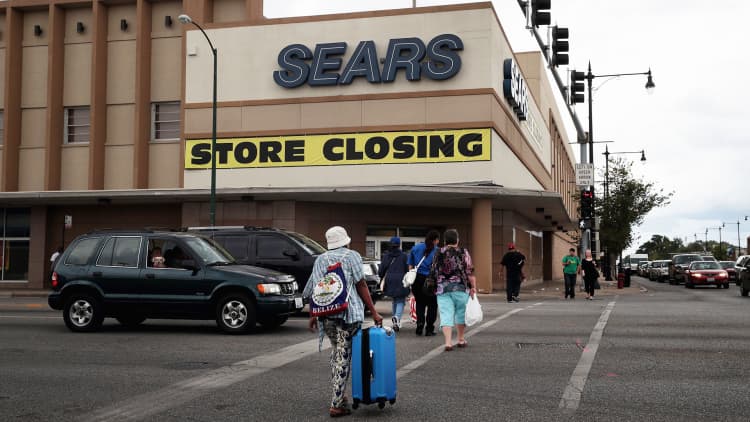Target has reached an important milestone in the delivery wars versus Walmart, Amazon and others.
The company is now more than halfway through its rollout of same-day delivery with Shipt and the launch of a curbside pickup service known as "Drive Up." Its goal, which Target said it's well on track to meet, is to have the services available at the majority of its stores before the holiday season.
The discount retailer said Chicago will be the first city in the U.S. to have all four of its new delivery and pickup options — Shipt, Drive Up, Target Restock and the fulfillment of online orders from within stores — starting this week.
Shipt, which Target acquired just a few months ago for $550 million, uses personal shoppers to stay in communication with a customer as they pick up items in the store. The personal shoppers text a recipient if an item is out of stock and alert him or her en route to delivery, for example. Target Restock is a delivery option that allows customers to order everyday essentials, like beauty and pet products, filling up a box up to roughly 45 pounds. (Amazon has a similar offering called Prime Pantry.)
Chicago is "an important and strong market for Target, with 80-plus stores, including a host of small-format stores," a company spokesman told CNBC about Target's investments in the area.
"It has a dense, urban population to support 'from-store' delivery," he added. "It's also a highly competitive market." (Amazon is reportedly slated to open its next cashierless store, Amazon Go, in Chicago.)
Still, Target's recent investments are under a lot of scrutiny. Unlike Walmart, which has made splashier moves scooping up smaller retailers and bulking up various international segments, Target has been focused on bolstering its supply chain, remodeling stores and launching new brands internally.
In the latest quarter, Target's investments were seen dragging profits down and shares sold off on the news. Perhaps overlooked, though, was the fact that the number of shoppers heading to Target rose 3.7 percent — the strongest performance in more than a decade.
Along with the excitement around new brands, four key "last mile" initiatives — same-day delivery via Shipt, Drive Up, Target Restock and the fulfillment of online orders from within stores — are luring more customers to Target and enticing them to buy more, the company has said.
"With Drive Up, we're seeing it as popular among parents of small children for 'fill-in trips' to pick up items like diapers," a company spokesman told CNBC. He also said those shoppers opting to have their online orders fulfilled at and shipped from a local Target store are increasing their basket sizes by six times, on average.
By the end of this month, Target said it will offer same-day delivery via Shipt in more than 135 markets. By next year, all "major product categories" at Target will come with the option to be shipped on the same day a purchase is made (some items are currently unavailable on the platform).
As of this week, more than 600 Target stores in 20 states offer Drive Up, while nearly 1,000 locations are set to offer the service by holiday season, according to the company.
"[T]he expectation is for the benefits [from the shipping and pickup options] to accelerate into next year as each of the programs mature and are rolled out more broadly," Gordon Haskett analyst Chuck Grom said in a recent note to clients.
"Target has accelerated its efforts over the past 12 months to leverage its vast store base [1,800+ locations] while providing customers with an array of convenient options to shop," Grom wrote. "In fact, management believes that by year end, Target's array of shopping options will put them on par, if not make them more convenient than Amazon."
Target Chief Operating Officer John Mulligan told CNBC that the company "feel[s] great about how guests are responding to these new services as we continue expanding them nationwide."
A Target customer must pay $99 annually to have access to Shipt for deliveries, rivaling other services including Instacart and Deliv.
For comparison, Amazon's Prime membership costs $119 per year for orders to qualify for free, two-day shipping. Walmart is meanwhile still working to bring its online grocery delivery service — where shoppers pay a flat delivery fee of $9.95, and a basket must contain at least $30 worth of items to qualify — to 100 metro areas by the end of 2018. Walmart also just launched Jetblack, a members-only platform where goods can be ordered over text message.
Target shares are up nearly 20 percent, trading at $77.90, so far this year. The retailer has a market capitalization of $41.7 billion.
WATCH: It was once the largest retailer in the US. Here's where Sears sits today



